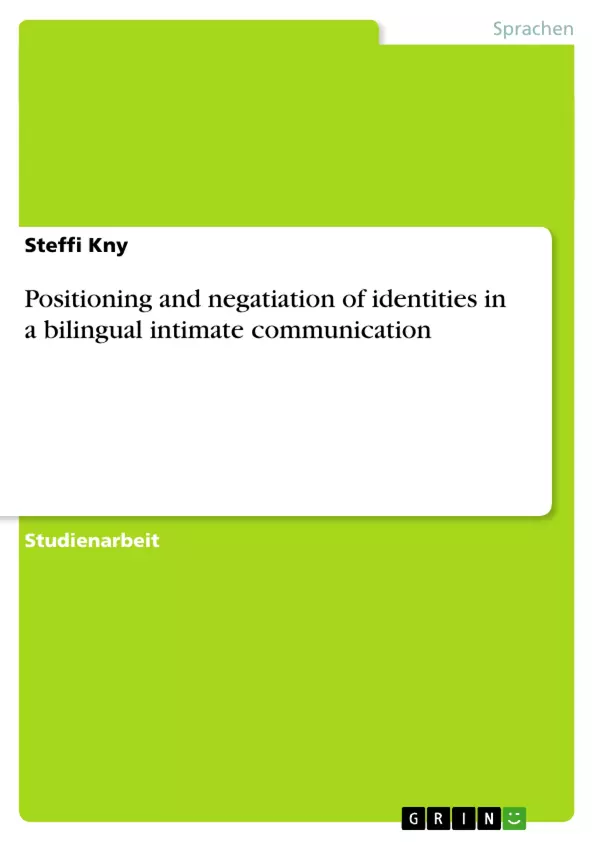Communication is an important aspect of an intimate relationship. It becomes even more important when both partners do not have the same native language and one of both (or sometimes both when a lingua franca is used) has to express in a language s/he is not completely proficient in, and e.g. might not know all connotations of the meanings. The level of proficiency one has in a language is important for the identity that is established or, i.e. negotiated through communication.
The frame of this paper is based on the framework of positioning by Harré and Davies (1990) and it aims to apply ideas from this framework to data I gathered from an intimate bilingual conversation. Furthermore, an article by Piller (2000) aboutLanguage choice in bilingual, cross-cultural interpersonal communication,analyzing language choice in bilingual intimate conversations, specifically Anglo-German couples, and their reasons should be taken into consideration.
This article is organized as following: first, I will give an introduction into the notions of positioning, identity, negotiation of identity. It implies that identities “are constructed in and through discourse.” (Riley, 2006: 297). In a next step, I will take a closer look at the language choice in bilingual relationships, I will identify possible reasons for one language to be chosen, and compare these with my own experience being a German and having a relationship with an American. The last part consists in analyzing the transcript. I have two transcripts that I will take into consideration: one is in English, and the other one is in German.
Inhaltsverzeichnis
- Abstract
- Introduction
- Positioning and identity
- Communication in bilingual couples and language choice
Zielsetzung und Themenschwerpunkte
Dieser Artikel untersucht die Positionierung und Verhandlung von Identitäten in einer intimen, zweisprachigen Kommunikation.
- Analyse von Gesprächstranskriptionen eines zweisprachigen Paares
- Anwendung des Frameworks der Positionierung und Verhandlung von Identität
- Untersuchung des Einflusses der Muttersprache und des Sprachniveaus auf die Identität
- Bedeutung der Sprachwahl in der interkulturellen Kommunikation
- Beziehung zwischen Positionierung und Identität in der zweisprachigen Kommunikation
Zusammenfassung der Kapitel
- **Abstract:** Der Artikel präsentiert zwei Transkripte von Gesprächen zwischen einem zweisprachigen Paar. Die Konzepte der Positionierung und Verhandlung von Identität werden angewendet, wobei der Fokus auf die Rolle der Muttersprache und des Sprachniveaus liegt.
- **Introduction:** Der Artikel hebt die Bedeutung der Kommunikation in intimen Beziehungen, insbesondere in zweisprachigen Beziehungen, hervor. Er stellt die theoretischen Grundlagen des Artikels vor und erläutert die Forschungsmethodik.
- **Positioning and identity:** Dieser Abschnitt definiert die Konzepte der Positionierung und Identität und beleuchtet die wechselseitige Beziehung zwischen diesen beiden Konzepten. Er erklärt die Rolle der Sprache bei der Konstruktion und Verhandlung von Identität in interkulturellen Beziehungen.
- **Communication in bilingual couples and language choice:** Dieser Abschnitt untersucht die Sprachwahl in zweisprachigen Beziehungen und die damit verbundenen Machtstrukturen. Er analysiert die Faktoren, die die Sprachwahl beeinflussen, und diskutiert den Einfluss der Sprache auf die kulturelle und persönliche Identität.
Schlüsselwörter
Zweisprachige Kommunikation, Positionierung, Identität, Verhandlung, Sprachwahl, Muttersprache, Sprachniveau, Interkulturelle Beziehungen, Intime Beziehungen.
Häufig gestellte Fragen
Was bedeutet „Positioning“ in der zweisprachigen Kommunikation?
Positioning nach Harré und Davies beschreibt, wie Individuen sich selbst und andere durch Diskurse in bestimmte Rollen bringen, was besonders in bilingualen Beziehungen die Machtdynamik beeinflusst.
Wie beeinflusst das Sprachniveau die Identität in einer Beziehung?
Ein Partner, der in einer Fremdsprache weniger kompetent ist, kann Schwierigkeiten haben, seine volle Persönlichkeit oder Nuancen auszudrücken, was die Verhandlung seiner Identität erschwert.
Warum wählen bilinguale Paare eine bestimmte Sprache?
Die Wahl hängt oft von der Kompetenz, dem kulturellen Kontext oder Machtstrukturen ab. Piller (2000) zeigt, dass auch emotionale Nähe oder die Rolle einer „Lingua Franca“ entscheidend sein können.
Was ist „Negotiation of Identity“?
Es ist der Prozess, bei dem Partner in Gesprächen aushandeln, wer sie sind. In zweisprachigen Beziehungen geschieht dies oft durch den Wechsel zwischen Sprachen und kulturellen Codes.
Welche Rolle spielt die Muttersprache in intimen Gesprächen?
Die Muttersprache bietet oft eine tiefere emotionale Ausdrucksmöglichkeit. Wenn ein Paar eine andere Sprache wählt, verändert dies die Art und Weise, wie Emotionen und Intimität konstruiert werden.
- Quote paper
- Steffi Kny (Author), 2006, Positioning and negatiation of identities in a bilingual intimate communication, Munich, GRIN Verlag, https://www.grin.com/document/68418



